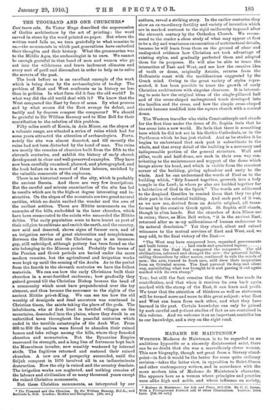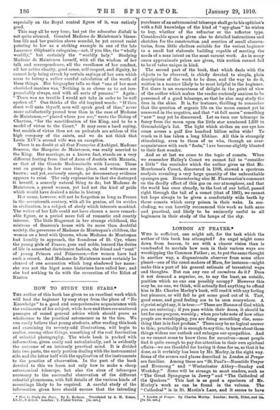MADAME DE MAINTENON.* WarsTarrit Madame de Maintenon is to be
regarded as an ambitious hypocrite or a sincerely disinterested saint, there can be no doubt that she was a marvellously clever woman. This new biography, though not great from a literary stand- point—in fact it would be the better for some quite ordinary revision—takes the latter view, in opposition to Saint-Simon and other contemporary writers, and in accordance with the more modern ides of Madame de Maintenon's character. She appears here as a woman whose principles and practice were alike high and noble, and whose influence on society, " Madame do Maistienen: has. Life and Times, 18:17-1719. By C. C. Dyson. With • Photogravure Porta-ait and 16 other Illustrations. London : John Lane. [1II. 6d. net.]
especially on the Royal central figure of it, was entirely good.
This may all be very true; but yet the advocalus diaboli is not quite silenced. Granted Madame de Maintenon's blame- less life and her position above scandal, he yet cannot resist pointing to her as a striking example in one of the late Laurence Oliphant's categories,—not, if you like, the "wholly worldly," but certainly the "worldly holy." Studying Madame de Maintenon herself, with all the wisdom of her talk and correspondence, all the excellence of her conduct, all her active charity, good sense, self-respect, and dignity, he cannot help being struck by certain sayings of her own which seem to betray a rather careful calculation of the worth of these things. Her biographer tells us that "one of her most cherished maxims was, 'Nothing is so clever as to act irre- proachably always, and with all sorts of persons." Again : "There was no trouble I would not take in order to be well spoken of." One thinks of the old inspired words : "If thou doest well unto thyself, men will speak good of thee," never more satisfactorily proved true than in the case of Madame de Maintenon,—" placed where you are," wrote the Bishop of Chartres, "for the sanctification of the King, and to be a model of virtue to the Court." It may seem a hard saying, but models of virtue thus set on pedestals are seldom of the high company of the saints, and we do not think that 'Louis XIV.'s second wife was an exception.
There is no doubt at all that Franeoise d'Aubign6, Madame Scarmn, the Marquise de Maintenon, was really married to the King. Her marriage, as a known fact, stands on a very different footing from that of Anne of Austria with Mazarin, or that of the Grande Mademoiselle with Lauzun. These rest on gossip ; in her case time, place, and witnesses are known ; and yet, curiously enough, no documentary evidence appears to exist. The only explanation is that she destroyed it herself, a scarcely natural thing to do; but Madame de Maintenon, a proud woman, yet had not the kind of pride which would have desired a niche in history.
Her name, however, will not be forgotten as long as France in the seventeenth century, with all its genius, all its strides in civilisation, is a subject of study which interests mankind. The writer of her Life could not have chosen a more remark- able figure, or a period more full of romantic and courtly interest. The little Huguenot in her strange childhood, the mistress of Scarron's house with its more than doubtful society, the governess of Madame de Monte-span's children, the woman on a level with Queens, whom Madame de Montespan had humbly to approach, the foundress of St. Cyr, where the young girls of France, poor and noble, learned the duties of life in somewhat doctrinaire fashion, the friend and "aunt" of young Princes and Princesses,—few women have bad such a record. And Madame de Maintenon must certainly he cleared of one accusation which long shadowed her name : she was not the bigot some historians have called her; and • she had nothing to do with the revocation of the Edict of Nantes.























































 Previous page
Previous page